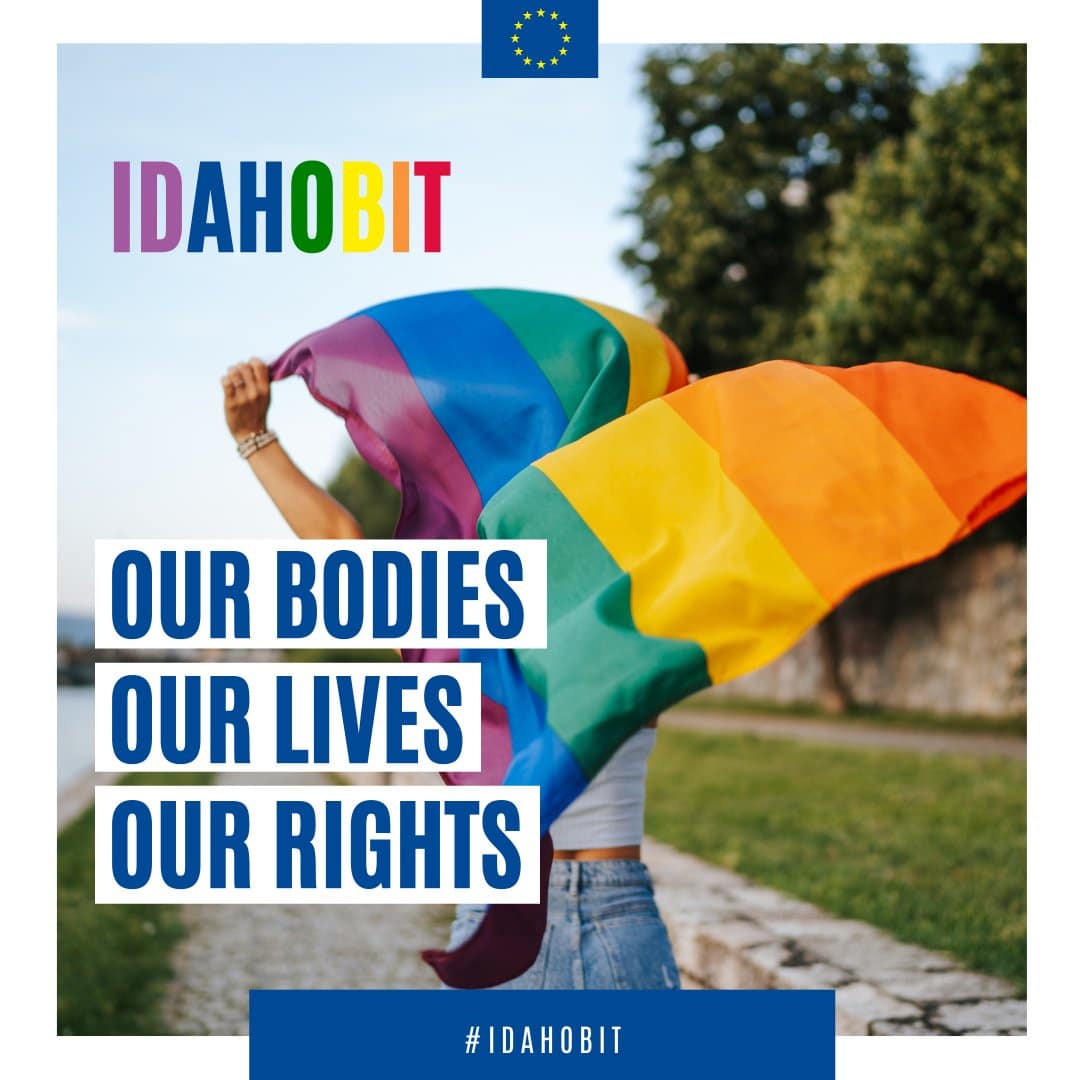
On the International Day Against Homophobia, Transphobia, Biphobia on 17 May, we want to shed light on the multiple and intersectional discriminations older Lesbian, Gay, Bisexual, Trans and Intersex (LGBTI) people face and recall their right to live free and in dignity!
Because of their lived experiences at the intersection between their age (ageism), actual or perceived sexual orientation (homophobia, biphobia), gender identity or gender expression (transphobia), or sex characteristics (interphobia), LGBTI people may suffer from multiple discriminations.
Strengthening EU non-discrimination policies
In November 2012, AGE Platform Europe and the European Region of the International Lesbian, Gay, Bisexual, Trans and Intersex Association (ILGA-Europe) created a joint policy paper to focus on the situation of older LGBTI people, suggesting relevant practices and policy recommendations to help older LGBTI people to age with rights. On 11 November 2020, the European Commission adopted an EU LGBTIQ Equality Strategy 2020-2025, the first-ever Commission strategy on LGBTIQ equality that ‘strives to build a Union where diversity is celebrated as part of our collective richness, where all people can be themselves without risk of discrimination, exclusion or violence.’ This is an important political step in recognising and defending the human rights of LGBTI people, supporting the mainstreaming of LGBTI rights in the work of the European Commission and other strategies.
On 21 January 2021, the European Commission published a Green Paper on Ageing on fostering solidarity and responsibility between generations, for which we highlighted the lack of consistent human-rights based approach across the Paper. This has negative impacts on advancing the human rights of older persons, and older LGBTI persons more specifically. The paper subscribes to a life course approach, ‘showing how much socio-economic inequalities accumulated across one’s life have a strong impact in older age’. Because LGBTI people suffer from multiple discriminations from a very young age and thorough their entire life, they are particularly exposed to socio-economic inequalities, leading to deeper disparities and exclusion at an older age. In its consultation on the Green Paper on Ageing to the European Commission, ILGA pointed out three major areas that are disproportionately impacting older LGBTI people: socio-economic exclusion and social protection, health, and long-term care. These discriminations include:
- Lack of legal and social recognition of same-sex relationships or one’s legal gender that leads to socioeconomic exclusion and social protection.
- Financial insecurity.
- Social isolation, exclusion, and invisibility.
- Inadequate and stigmatising healthcare services.
- Lack of access to education and information on sexual health that is mainly targeting younger people.
- Discrimination in long-term care facilities, from residents, staff and institutional structures.
Specific barriers to healthcare
Trans and intersex people are particularly exposed to cumulative discriminations and reluctance to seek healthcare. As ILGA points out, ‘older intersex people are often reluctant to seek healthcare due to their high exposure to traumatic experiences when receiving healthcare throughout their life. Intersex people of all ages have lower physical and mental health outcomes, with nearly four times the prevalence of suicide attempts than the general population, according to one European study. Furthermore, the high exposure to unconsented medical procedures among intersex people leads to a widespread distrust of the medical system, including assisted care facilities and in-home care workers.’ Trans people face similar challenges when getting older since they have to disclose their bodies to healthcare practitioners. In addition, we must consider the huge diversity of trans people depending on the number of years during which they have lived with a gender other than the one assigned at birth or during which they have lived in their new gender role and body. Other might not have undergone any form of gender reassignment at all.
In addition to the LGBTIQ Equality Strategy, ILGA provided the European Commission with recommendations on healthcare and long-term care:
- Assess with Member States how to ensure equitable access for LGBTI people to pensions without discrimination.
- Exchange good practices regarding social inclusion of older LGBTI people in care homes.
- Ensure that transition-related healthcare is covered by health insurance, including for those in assisted living facilities.
- Expressly mandate equality bodies to investigate multiple discrimination and matters affecting older LGBTI people and make sure that older people are able to report abuses or discriminatory practices easily through publicised mechanisms and are informed of their rights.
- Assess the needed legislative changes to allow for succession rights and joint tenancies to be available for all couples and provide specific information and support to older LGBTI people on possibilities of passing their benefits, assets and inheritance to their surviving partner.
- Make sure that support services available to older people are inclusive and respectful of all, including LGBTI people.
It is time that Europe advances and fulfils the human rights of older LGBTI people. Their bodies, their lives, and their rights matter and must not be forgiven!
More information
- EU green Paper on Ageing: what should be in?
- EU green Paper on Ageing: a key opportunity to make concrete steps towards a more inclusive future for all ages
- Green paper on Ageing – Age equality is not negotiable!
- Roadmap on the Green Paper on Ageing Feedback from AGE
- Green Paper on Ageing – AGE meets the European Commission to discuss follow-up
- AGE’s feedback on the consultation on the Green Paper on Ageing
- ILGA-Europe submission to the European Commission’s consultation on the Green Paper on Ageing
- Joint Policy Paper by AGE Platform Europe and ILGA-Europe on Equality for older lesbian, gay, bisexual, trans, and intersex people in Europe
- EU LGBTIQ Equality Strategy – First year implementation evaluation
For more information, please contact Human Rights Officer, Apolline Parel at apolline.parel@age-platform.eu






